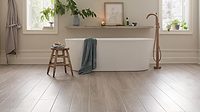
DriTac’s 1001 All-In-One adhesive.
DriTac products certified by CRI Green Label Plus
An array of DriTac products, including adhesives and a moisture barrier/crack suppressant, have been certified by the Carpet and Rug Institute’s (CRI) Green Label Plus Program for indoor air quality.Specifically, DriTac 1001 All-In-One Urethane Adhesive/4-In-1 System, DriTac 7500 Eco-Urethane Adhesive, DriTac 7700 Easy Clean MS Polymer Adhesive, DriTac 9200 FasTac Polymeric Resin Adhesive and DriTac Eco-8000 Moisture Guard Concrete Moisture Barrier and Crack Suppressant can contribute to LEED credits and have been tested, approved and certified by the Carpet and Rug Institute’s Green Label Plus program.
NSF launches Product Category Rule, Environmental Product Declaration programs
NSF International has launched two new environmental programs to meet the growing demand for science-based support to verify environmental product claims. NSF can now provide Product Category Rule (PCR) development and Environmental Product Declaration (EPD) verification across multiple product groups and industries.Based on international environmental management guidelines (ISO 14025), PCRs define how to conduct a lifecycle assessment for a particular product group and what to include in the resulting report. The EPD is the third-party-verified report that explains the data generated from a lifecycle assessment.
NSF’s National Center for Sustainability Standards (NCSS), serves as a program operator for developing Product Category Rules. NCSS has already begun working with several flooring trade associations (including CRI, NWFA, NALFA, RFCI and TCNA) on the first North American PCR for resilient, carpet, laminate, tile, and wood flooring products.
According to Bill Freeman, RFCI consultant, “Product Category Rule development provides the necessary foundation for lifecycle assessment reporting and Environmental Product Declarations of flooring materials. All three are essential to lend credibility to environmental data and provide our customers with a comprehensive tool to evaluate the environmental impacts of their flooring products.”
For more information, contact Mindy Costello, NSF sustainability standards specialist, at mcostello@nsf.org.
Universal Textile Technologies backings UL-verified for NSF 140
Universal Textile Technologies’ (UTT) BioCel, EnviroCel and EnviroCel Home backing systems have been third-party verified by UL Environment as meeting the requirements for NSF 140 certification.“UL Environment is excited to be working with UTT to make sustainable product certification easier for carpet manufacturers,” said Chris Nelson, UL Environment’s director global commercial development. “This completed project will enable those seeking NSF 140 certification through UL Environment to pursue expedited certification when using the UTT carpet backing.”

Study finds that energy efficiency may lead to greater health risk
The Institute of Medicine has published a new study, “Climate Change, the Indoor Environment and Health,” that examines the link between climate change, indoor air quality and public health. According to the report, buildings that follow an energy-reduction strategy can lead to higher concentrations of and exposure to indoor pollutants, due to a lower ventilation rate.“Introduction of new materials and weatherization techniques may lead to unexpected exposures and health risks. Energy-efficient programs should therefore incorporate tracking mechanisms to identify problems with indoor environmental quality as they arise and to gather information on the effectiveness of solutions as they are developed and implemented,” the report stated.
The Institute of Medicine advises that the EPA and other federal agencies “join to develop or refine protocols and testing standards for evaluating emissions from materials, furnishing, and appliances used in building and to promote their use by standards-setting organization and in the marketplace.”
For more information and to download a copy of the study, visithttps://download.nap.edu/catalog.php?record_id=13115.
--
Sponsored by:MAPEI.


